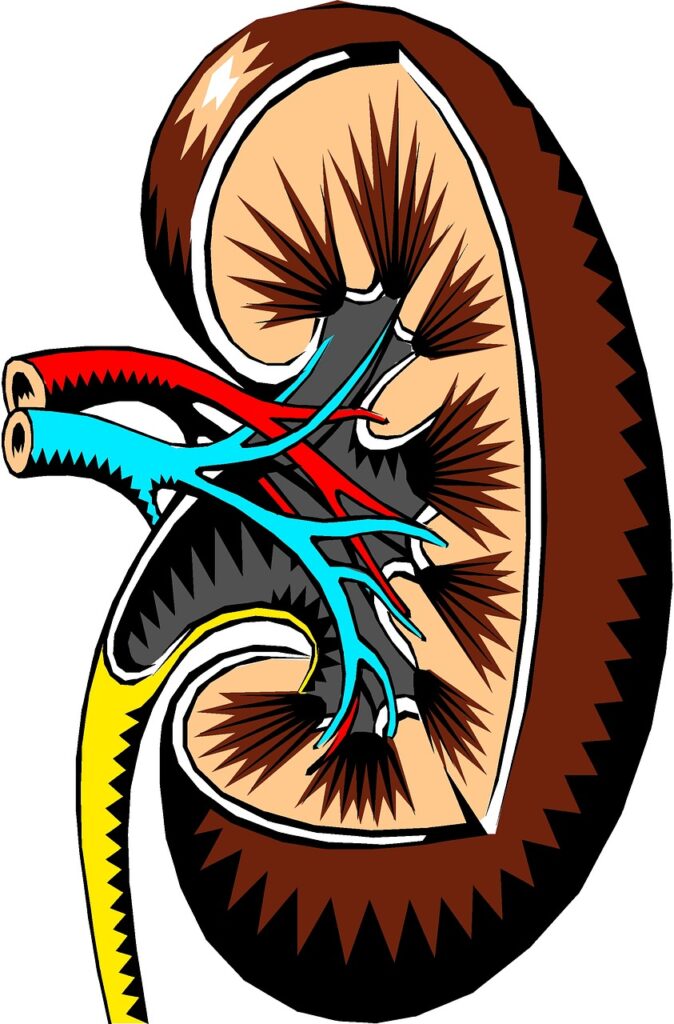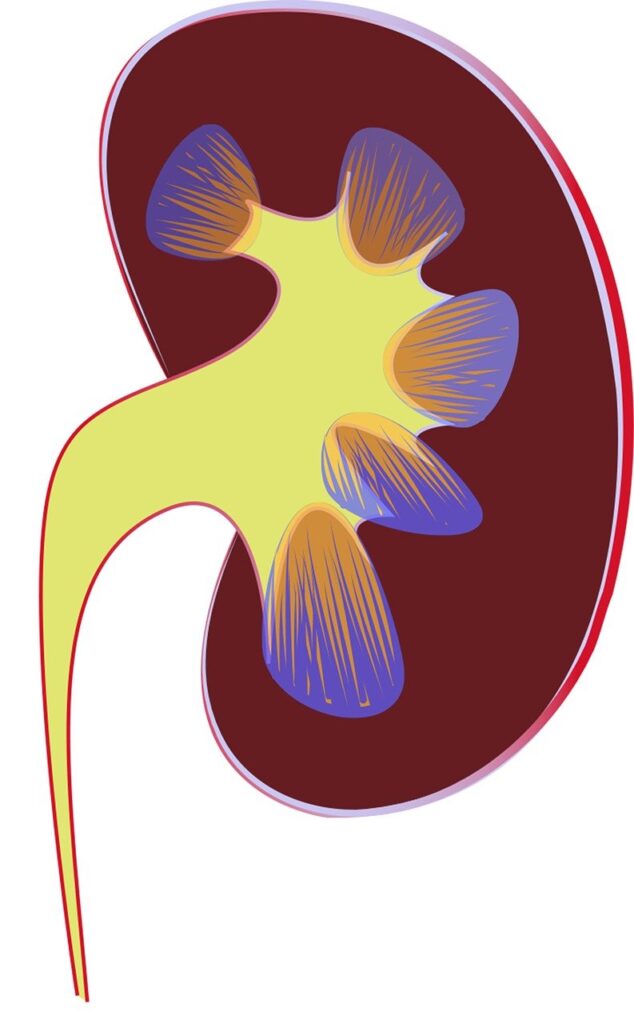Kidney stones, clinically referred to as nephrolithiasis, present a distressingly painful and unsettling health condition. It is imperative to grasp the intricacies of their definition, pathology, diverse types, progressive stages, underlying causes, associated risk factors, and the manifestation of signs and symptoms.
Equally crucial is an exploration of general management strategies, preventive measures, investigative procedures, and the potential role of homeopathy in effectively addressing kidney stones. This introductory guide aims to unravel the complexities surrounding kidney stones, shedding light on their various aspects while delving into how homeopathy can serve as an alternative avenue for managing this challenging condition.

Let’s Define Kidney Stones
Kidney stones, scientifically known as nephrolithiasis, manifest as rigid, crystalline mineral deposit formed within the confines of the kidneys or the urinary tract. These formations exhibit a spectrum of sizes, ranging from minute particles resembling grains of sand to substantial structures akin to a golf ball.
The composition of these stones is diverse, with calcium oxalate being the most prevalent. Additionally, stones may comprise uric acid, struvite, or cystine. Understanding the nuanced composition plays a pivotal role in tailoring appropriate strategies for management and prevention.
Pathology of Kidney Stones
The formation of kidney stones is a complex process, typically driven by the concentration of certain substances in the urine. The pathology involves the following key steps:
- Supersaturation: An excessive concentration of minerals or salts in the urine can lead to supersaturation. This occurs when the urine lacks the necessary substances to dissolve these minerals.
- Nucleation: Super-saturated urine provides an environment for crystals to form, acting as a nucleus for stone formation.
- Growth: Once the crystals start forming, they can grow over time and develop into larger, solid stones.
- Aggregation: Crystals can stick together, creating a conglomerate structure that eventually becomes a kidney stone.
- Passage or Obstruction: Kidney stones can either pass through the urinary system naturally or become stuck in the urinary tract, leading to various symptoms and complications.
Types Of Kidney Stones
Calcium Oxalate
Composition: These stones, prevalent among kidney stones, primarily consist of calcium and oxalate.
Formation: They can arise when there is an excess accumulation of calcium and oxalate substances in the urine.
Uric Acid Stones
Composition: Uric acid stones materialize due to elevated levels of uric acid in the urine, often correlated with conditions such as gout.
Formation: The presence of high uric acid levels contributes to the development of these stones.
Struvite Stones
Composition: Struvite stones are commonly induced by urinary tract infections and are composed of magnesium, ammonium, and phosphate.
Formation: Infections in the urinary tract create an environment conducive to the development of these stones.
Cystine Stones
Composition: Cystine stones, albeit rare, form due to a genetic disorder affecting the reabsorption of specific amino acids.
Formation: The genetic anomaly disrupts the normal reabsorption process, leading to the accumulation and crystallization of cystine.
The Different Stages of Kidney Stones
The development and progression of kidney stones can be categorized into four stages:
- Formation: This is the initial stage where crystals begin to form due to supersaturation of minerals in the urine.
- Growth: As crystals continue to accumulate, they can grow in size, leading to the formation of small stone particles.
- Passage or Obstruction: Once the stones reach a certain size, they can either pass through the urinary tract, causing severe pain during the process, or become lodged, leading to obstruction and further complications.
- Complications: If not managed promptly, kidney stones can lead to various complications, including urinary tract infections, kidney damage, and in severe cases, the need for surgical intervention.
The Causes Of Kidney Stones
Understanding the causes and risk factors of kidney stones is essential for effective prevention. The primary causes and risk factors include:
- Dehydration: Inadequate fluid intake leads to concentrated urine, heightening the risk of kidney stone formation.
- Diet: A diet rich in oxalate, salt, and purines contributes to the development of kidney stones.
- Medical Conditions: Conditions like gout, hyperparathyroidism, and urinary tract infections elevate the risk of kidney stone formation.
The Risk Factors Of Kidney Stones
- Family History: A familial predisposition to kidney stones increases the individual’s risk.
- Age and Gender: Men, especially as they age, are more prone to kidney stones compared to women.
- Obesity: Excessive body weight alters urinary patterns, escalating the likelihood of stone formation.
- Medications: Certain medications, including diuretics and antacids, can contribute to the formation of kidney stones.
The Signs And Symptoms of Kidney Stones
- Hematuria: Presence of blood in the urine, leading to pink, red, or brown-colored urine.
- Severe Abdominal or Flank Pain: Intense cramping pain in the lower back or side, radiating to the lower abdomen and groin, is a common and distinctive symptom.
- Painful Urination: Discomfort and pain during urination may be prevalent.
- Frequent Urination: An increased urge to urinate is a characteristic symptom.
- Nausea and Vomiting: Nausea and vomiting may occur due to the pain and discomfort associated with kidney stones.
- Cloudy or Foul-Smelling Urine: Changes in urine appearance and odor can indicate the presence of kidney stones.
- Fever and Chills: In the presence of an infection, symptoms such as fever and chills may manifest.
- Difficulty Passing Urine: Complete obstruction can lead to an inability to urinate.
It’s crucial to seek medical attention if you experience these symptoms, as prompt diagnosis and treatment can alleviate pain and prevent complications.
General Management Of Kidney Stones
Once diagnosed, the management of kidney stones is aimed at relieving symptoms and facilitating the passage of the stones. The general management strategies include:
- Hydration: Increasing fluid intake is crucial to flush out the stones naturally. Aim for at least 2-3 liters of water daily.
- Pain Management: Over-the-counter pain relievers, prescribed by a healthcare provider, can help alleviate pain.
- Medications: Depending on the stone type, medications may be prescribed to aid in dissolution or passage.
- Lifestyle Modifications: Adopting a low-oxalate diet and reducing salt intake can prevent further stone formation.
- Observation: Smaller stones may pass naturally with time and ample hydration. Regular follow-up with a healthcare provider is necessary.
- Surgical Intervention: In cases of severe obstruction or complications, surgical procedures may be required to remove or break down the stones.
General Prevention Of Kidney Stones
Preventing the formation of kidney stones is paramount, and the following general guidelines can significantly reduce the risk:
1. Stay Hydrated: Ensure adequate water intake to maintain dilute urine and prevent mineral supersaturation.
2. Dietary Modifications: Reduce the consumption of high-oxalate foods like spinach, beets, and nuts, and limit salt intake.
3. Balanced Diet: Maintain a well-balanced diet with sufficient calcium, as a low-calcium diet can increase the risk of stone formation.
4. Limit Animal Protein: Moderation in the consumption of animal proteins can mitigate the risk of stone formation.
5. Monitor Medications: Be aware of medication side effects and discuss potential stone formation risks with your healthcare provider.
6. Regular Exercise: Stay physically active to maintain a healthy weight and reduce the risk of kidney stones.
What To Eat To Control Kidney Stones?
Certain foods can aid in preventing kidney stones. Consider incorporating the following into your diet:
1. Citrus Fruits: Oranges and lemons, rich in citrate, can help prevent stone formation.
2. Watermelon: High water content in watermelon helps maintain hydration.
3. Basil: Traditionally used in Ayurvedic medicine, basil supports kidney health.
4. Pomegranate Juice: May contain compounds inhibiting stone formation.
5. Celery: Natural diuretic properties in celery help flush out toxins.
6. Kidney Beans: Beneficial for overall kidney health, named for their resemblance to human kidneys.
Remember, while these foods are beneficial, they should be part of a well-balanced diet aimed at preventing kidney stones.
What You Should Avoid Eating During Kidney Stones
The composition of kidney stones varies, necessitating dietary considerations. Here are foods to avoid for different types of kidney stones.
1. Calcium Oxalate Stones
- Avoid high-oxalate foods, including spinach, beets, rhubarb, and sweet potatoes.
- Limit consumption of nuts, chocolate, and tea.
- Reduce salt intake, as a high-sodium diet can increase calcium in the urin.
2. Uric Acid Stones
- Minimize purine-rich foods, such as organ meats, red meat, and certain seafood (e.g., anchovies, sardines, and mussels).
- Limit alcohol and fructose-containing beverages.
- Reduce high-fructose corn syrup found in processed foods.
3. Struvite Stones
- Struvite stones are often associated with urinary tract infections. Preventing these infections is key to avoiding struvite stones. Maintain good urinary hygiene and promptly treat any urinary infections.
4. Cystine Stone
- Cystine stones are rare and often related to a genetic disorder. Adequate hydration is crucial to prevent their formation. Drink plenty of water to dilute urine and minimize cystine concentration.
5. Mixed Stones
- When kidney stones are composed of a combination of minerals, it becomes crucial to tailor your diet to minimize the formation of the predominant type of stone.
- Consulting with a healthcare provider is essential to determine the most suitable dietary plan based on the specific composition of mixed stones.
Investigations For Kidney Stones
When kidney stones are suspected, investigations are crucial for diagnosis and treatment planning:
1. Imaging: X-rays, ultrasounds, and CT scans provide detailed images of the urinary tract, aiding in stone identification.
2. Uralysis: Examination of urine reveals the presence of blood and crystalline substances, indicative of kidney stones.
3. Blood Tests: Identify underlying conditions contributing to stone formation, such as elevated levels of calcium or uric acid.
4. Stone Analysis: Analysis of passed or removed stones determines composition, informing future prevention strategies.
Homeopathy And Kidney Stones
Having explored the multifaceted aspects of kidney stones, it’s now pertinent to delve into the role of homeopathy in managing this condition.
Homeopathy, as a holistic system of medicine, focuses on treating individuals rather than merely addressing symptoms. The remedies used in homeopathy are derived from natural substances and undergo a process of potentization, involving dilution and succussion (shaking) to enhance their healing properties while minimizing side effects.
While it is crucial to emphasize that homeopathy does not replace conventional medical treatment, it can serve as a complementary approach. Homeopathic remedies may help alleviate the symptoms of kidney stones, facilitate their passage, and reduce the likelihood of recurrence.
Here are some common homeopathic remedies that could be beneficial for individuals dealing with kidney stones:
- Berberis Vulgaris: This remedy is often used for kidney stones with sharp, shooting pains and backache. It may help relieve the pain and discomfort associated with kidney stones.
- Lycopodium Clavatum: Lycopodium is considered when there is pain in the right kidney, often extending to the bladder. It may also help with bloating and digestive issues, which can be common in kidney stone patients.
- Cantharis: Cantharis is used when there is intense burning and cutting pain during urination, which is a hallmark symptom of kidney stones.
- Sarsaparilla: This remedy is indicated when there is severe pain at the end of urination, and urine may contain blood or sediment.
- Hydrangea Arborescens: Hydrangea is recommended for renal colic, pain in the bladder region, and stone fragments in the urine.

Let’s Sum It Up
For those grappling with suspected kidney stones or a history of stone formation, consulting with a healthcare provider is paramount. A personalized treatment plan, curated by a healthcare professional, may encompass conventional medical treatments, dietary adjustments, lifestyle modifications, and, when deemed suitable, the integration of homeopathic remedies.
It is crucial to recognize the importance of early intervention and prevention in effectively managing kidney stones and averting their recurrence. By adopting a proactive stance and seeking professional guidance, individuals can navigate the challenges posed by kidney stones with a comprehensive and tailored approach to their well-being.
Reach out to us for a Consultation
This blog is for information purposes. It’s crucial to note that while homeopathy is a centuries-old practice with many adherents worldwide, always consult a qualified homeopath or medical professional before initiating any treatment.
For any queries, reach out to us at contact@homeopathic.ai





